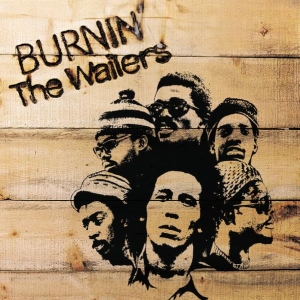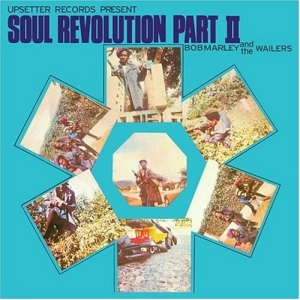
Uprising is the twelfth studio album by Bob Marley and the Wailers released in 1980. Marley died the following year, and Uprising was the final studio album released during his lifetime. This album is one of Marley's most directly religious, with nearly every song referencing his Rastafarian beliefs, culminating in the acoustic recording of "Redemption Song".

Exodus is a 1977 album by Jamaican reggae band Bob Marley and the Wailers, first released in June 1977 through Island Records, following Rastaman Vibration (1976). The album's production has been characterized as laid-back with pulsating bass beats and an emphasis on piano, trumpet and guitar. Unlike previous albums from the band, Exodus thematically moves away from cryptic story-telling; instead it revolves around themes of change, religious politics, and sexuality. The album is split into two halves: the first half revolves around religious politics, while the second half is focused on themes of making love and keeping faith.

Burnin' is the sixth album by Jamaican reggae group the Wailers, released in October 1973. It was written by all three members and recorded and produced by the Wailers in Jamaica, contemporaneously with tracks from the Catch a Fire album with further recording, mixing and completion while on the Catch a Fire tour in London. It contains the song "I Shot the Sheriff", which was later covered by Eric Clapton. It was the last album before Marley, Peter Tosh and Bunny Wailer decided to pursue solo careers, while continuing their local releases through their company Tuff Gong Records. A commercial and critical success in the United States, Burnin' was certified Gold and later added to the National Recording Registry, with the Library of Congress deeming it historically and culturally significant.

Confrontation is the thirteenth and final studio album by Bob Marley & the Wailers and the only to be released posthumously in May 1983, two years after Marley's death. The songs were compiled from unreleased material and singles recorded during Marley's lifetime. Many of the tracks were built up from demos, most notably "Jump Nyabinghi" where vocals from the I-Threes were added, which were not there when Marley released the song as a dubplate in 1979. In addition the harmony vocals on "Blackman Redemption" and "Rastaman Live Up" are performed by the I-Threes in order to give the album a consistent sound – on the original single versions they are performed by the Meditations. The most famous track on the album is "Buffalo Soldier".

Bob Marley and the Wailers were a Jamaican ska, rocksteady and reggae band. The founding members, in 1963, were Bob Marley, Peter Tosh, and Bunny Wailer.

"Redemption Song" is a song by Jamaican singer Bob Marley. It is the final track on Bob Marley and the Wailers' twelfth album, Uprising, produced by Chris Blackwell and released by Island Records. The song is considered one of Marley's greatest works. Some key lyrics derived from a speech given by the Pan-Africanist orator Marcus Garvey titled "The Work That Has Been Done."

The Upsetters was the name given to the house band for Jamaican reggae producer Lee "Scratch" Perry. The name of the band comes from Perry's nickname of Upsetter, after his song "I Am the Upsetter", a musical dismissal of his former boss Coxsone Dodd.

Soul Rebels is the second studio album by the Wailers, their first album to be released outside Jamaica. The Wailers approached producer Lee "Scratch" Perry in August 1970 to record an entire album, and the sessions took place at Randy's recording studio above Randy's Record Mart at 17 North Parade in Kingston, Jamaica, until November. First issued in the UK by Trojan Records in December 1970, the album has since been re-released several times on several different labels. Perry's production is sparse and haunting, only featuring guitar, bass, drums, electronic organs, and vocals with no horns or other embellishments.

Soul Revolution Part II is the third album by Bob Marley and the Wailers. It was produced by Lee "Scratch" Perry. While the name on the album cover for all the original releases was Soul Revolution Part II, some releases had the name Soul Revolution printed on the album label, leading to uncertainty over what name was intended. A "dub" version with the vocals removed was released as Soul Revolution Part II Dub; both versions were released as one set in 1988. The album was repackaged with additional material as African Herbsman in 1973.

The Best of the Wailers is the fourth studio album by the Wailers, released in August 1971. Despite its title, it is not a compilation album. The album was recorded in May 1970 but not released until August 1971.

Albert Anderson is an American-born songwriter and guitarist.

Earl "Chinna" Smith, a.k.a. Earl Flute and Melchezidek the High Priest, is a Jamaican guitarist active since the late 1960s. He is most well known for his work with the Soul Syndicate band and has recorded with many reggae artists, appearing on more than 500 albums.
Martha Carmen Josephine Hernandéz Rosario de Veléz is an American singer and actress of Puerto Rican descent.

Robert Nesta Marley was a Jamaican singer, musician, and songwriter. Considered one of the pioneers of reggae, his musical career was marked by fusing elements of reggae, ska, and rocksteady, as well as his distinctive vocal and songwriting style. Marley's contributions to music increased the visibility of Jamaican music worldwide, and made him a global figure in popular culture to this day. Over the course of his career, Marley became known as a Rastafari icon, and he infused his music with a sense of spirituality. He is also considered a global symbol of Jamaican music and culture and identity, and was controversial in his outspoken support for democratic social reforms. In 1976, Marley survived an assassination attempt in his home, which was thought to be politically motivated. He also supported legalization of marijuana, and advocated for Pan-Africanism.
Watty Burnett, also known as King Burnett is a reggae artist who had a long association with Lee Perry.

Wild and Free is the fourth solo studio album of Jamaican singer Ziggy Marley. The album was released on June 14, 2011. Wild and Free was produced by Don Was at Ocean Way Studios in Hollywood, California.

Mamadee is a German Reggae singer and songwriter.

Winston Hubert McIntosh, OM, professionally known as Peter Tosh, was a Jamaican reggae musician. Along with Bob Marley and Bunny Wailer, he was one of the core members of the band the Wailers (1963–1976), after which he established himself as a successful solo artist and a promoter of Rastafari. He was murdered in 1987 during a home invasion.

Skip Marley Minto is a Jamaican singer. He is the son of Cedella Marley and David Minto, and grandson of Bob Marley. He has received two Grammy Award nominations and an MTV Video Music Award nomination.

"Chained to the Rhythm" is a song by American singer-songwriter Katy Perry that served as the lead single from her fifth studio album, Witness. It features vocals from Jamaican singer Skip Marley. The artists co-wrote the track with its producers Max Martin and Ali Payami, with additional writing from Sia. Capitol Records released the track on February 10, 2017, as a digital download. "Chained to the Rhythm" is a dance-pop, disco and dancehall song, with lyrics about political awareness.
















